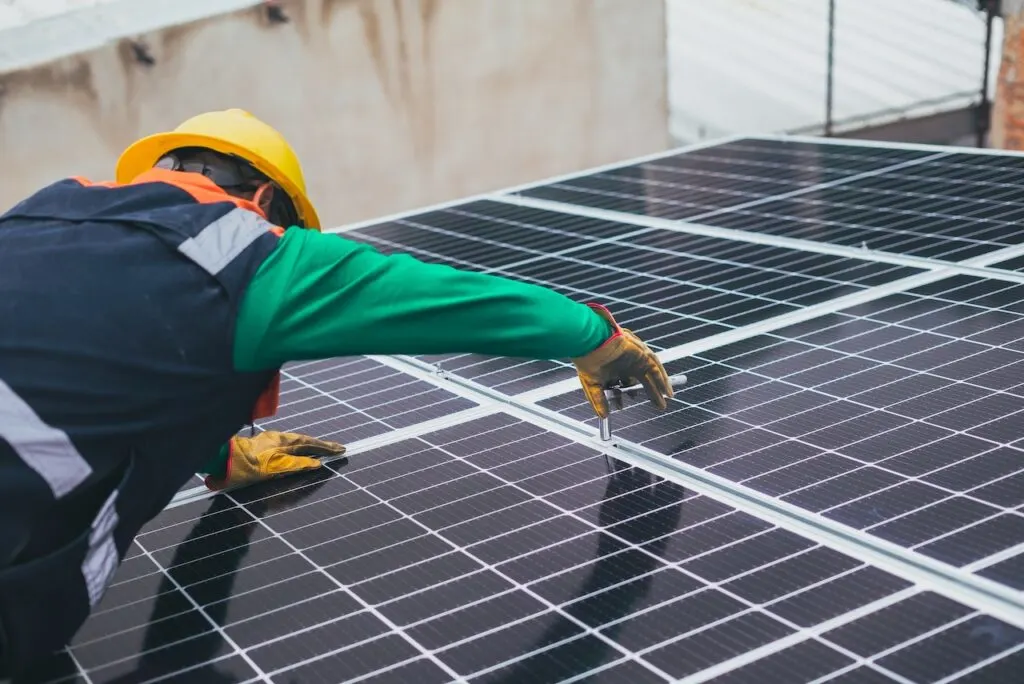Are you interested in installing solar panels?
As a homeowner, solar panels are one of the best ways you can save money on your utility bills. But before you install solar panels, you might wonder if the investment will be worth it.

Today I am sharing some basic facts about solar panels as well as the benefits of having the best solar panels for your home’s electrical system. Knowing these can help you to make an informed decision about whether or not solar energy is right for you.
Let’s get started.
How Do Solar Panels Work?
Solar panels turn sunlight into electricity, via a process known as photovoltaics. Sunlight is made up of photons, which are particles of solar energy.
When the photons hit the solar panel, they knock the electrons loose from the atoms in the cell, causing a flow of electricity in the wires. This is then passed through an inverter, which transforms the electricity from direct current (DC) to alternating current (AC), powering electronics and other electrical devices. Solar panels are designed to be durable and efficient to maximize their use of the sun’s energy.
5 Benefits of Solar Panels
As the demand for energy increases, so does the dependence on fossil fuels and other sources of energy that are harmful to the environment. Installing solar panels is a smart way to invest in your home and the planet.
Many homeowners are discovering that investing in solar panels can be a great long-term investment. Especially because solar technology has improved drastically over the years. Here are some of the best benefits of using solar energy.
1. Endless Supply of Energy
One of the biggest benefits of installing solar panels is that they can provide an endless supply of energy. The sun, after all, is an inexhaustible source of energy that can never run out. Thus, it eliminates the worry of relying on finite sources of fuel, such as wood or coal, that could run out.
2. Reduction in Energy Bills
Installing solar panels can help reduce your energy bills, often eliminating them altogether from certain networks. The amount of savings depends on how much energy you consume and how much sunlight the system can capture. You can use the produced electricity in many different ways such as lighting, cooking, home appliances, and even selling back to the electricity grid if not needed.
3. Environmental Impact
Solar panels have a positive environmental impact. They generate clean and renewable energy to help reduce air pollution from air-polluting sources, like burning coal or oil for electricity.
They can reduce the risk of global warming by decreasing the amount of energy taken from non-renewable sources. Solar energy is abundant, so its use and the number of people who go green will only continue to grow in the future.
4. They Can Increase the Value of a Property
Solar panels can help increase the value of a property. These can help reduce environmental pollution. This will give your property a green eco-friendly seal of approval and this appeal will help to increase its worth.
Solar panel installers usually offer a warranty for their products and services, and this helps to increase the value of a property. They have an attractive appearance and they can help to raise the esthetic value of the property. This can attract buyers who are looking for an eco-friendly home.
5. Tax Breaks and Rebates
Installing solar panels can also qualify you for rebates or tax breaks. If you purchase a solar system during the tax year, you will qualify for the Federal Solar Tax Credit. This program allows you to claim a percentage (usually up to 30%) of the total qualifying cost of the system on your federal income taxes.
Navigating Tax Breaks and Rebates
In addition to the federal tax credit, new solar customers may also be able to take advantage of other incentives and/or credits to reduce the total installation costs of their system. Depending on where you live, these could be anything from electric utility rebates and renewable electric certificates to state government rebates and state tax credits.
Here are some steps to help you navigate the process of qualifying for any incentives.
First, you need to review the current incentive programs offered in your state or local area as the exact amounts and conditions can vary from place to place. While many states offer these financial incentives, you need to do your research to ensure that you are eligible.
If your system is leased, consult the leasing company about the terms of the lease and the eligibility for any rebates or tax credits. Keep all documentation, receipts, and application forms related to the solar panel installation so you can properly document any incentive you receive.
Components That Influence the Cost of Installing Solar Panels
The cost of installing solar panels depends on many factors. This can include the types of solar panels and number, size of the installation, and any other additional equipment, such as inverters, batteries, and meters, that may be necessary.
Another crucial consideration is the location of the solar panel installation. Costs can vary based on the area, electricity rates, and sunlight conditions. Opting for a reputable solar company near you can be beneficial; they’ll likely be more attuned to local requirements, regulations, and incentives, resulting in a smoother and more efficient installation process.
Different types of panels and technology come with different price tags, and it is important to select the most cost-effective options by working with professional installers.
Installing Solar Panels Is a Game Changer
Installing solar panels can be a game changer for everyone. It can reduce your carbon footprint, save you money on electricity, and help preserve the environment.
Solar panels are now more affordable and accessible than ever – harness the power of the sun to reduce your impact on the environment and your energy bills. Check out the offers available in your area today to get started!
